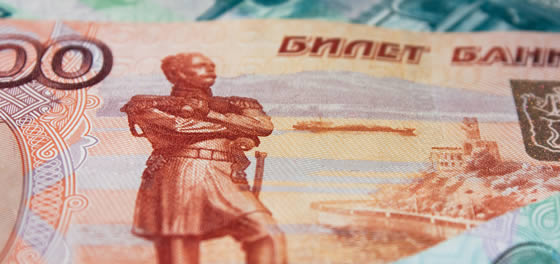
Russia’s Bankrupting Empire
Publication: Eurasia Daily Monitor Volume: 12 Issue: 121
By:

Following the June 22 decision by the European Union to extend its sanctions on Russia for another six months, Russian Prime Minister Dmitry Medvedev soberly declared two days later that the country’s faltering economy would force the government in Moscow to make some difficult choices regarding meeting its spending commitments. Citing the negative impact of the West’s sanctions—passed in response to Russia’s aggressive actions in Ukraine—as well as low oil prices, which have been squeezing government revenues, Medvedev noted, “We all need to assess the existing risks realistically. The budget parameters largely depend on the current economic situation” (RIA Novosti, June 24). He further warned that Russia has few current opportunities to increase the state’s finances, which may necessitate carrying out highly unpopular measures like cutting back on pensions (Interfax, June 24).
The Kremlin attempted to paint a much rosier picture. Dmitry Peskov, the spokesperson for the Russian presidential administration, declared that Moscow’s decision to extend its own counter-sanctions on European imports would be healthy for Russia’s economy because the country could rebuild its domestic industry to replace the now banned imports from the West—the so-called strategy of “import substitution” (Interfax, TASS, June 24). However, mounting evidence suggest that the reality is much more likely to reflect Medvedev’s gloomy predictions over the Kremlin’s bombastic defiance. Not only are the government’s vaunted promises of the benefits of “import substitution” unlikely to make any substantial headway for many, many years, if at all (Windowoneurasia2.blogspot.com, Globalsib.com, January 20, 2015; see EDM, December 8, 2014; June 22, 2015), but Russia’s ruinous financial situation looks increasingly likely to break apart some of the final vestiges of Moscow’s imperial holdings—both at home and beyond the Russian Federation’s internationally recognized borders.
Close to home, the impact of Western sanctions and low oil prices have already resulted in one region of the Russian Federation defaulting on its debts—the northwestern federal subject of Novgorod Oblast. Meanwhile, the ethnic republics of the volatile North Caucasus themselves represent a looming economic crisis. Each of the North Caucasus republics—Adygea, Kabardino-Balkaria, Karachaevo-Cherkessia, North Ossetia, Ingushetia, Chechnya and Dagestan—draws more than half of its annual budget from the central government. Chechnya and Ingushetia are even more dependent, taking in over 80 percent of their revenues from Russia’s shrinking state coffers. With the weak economic situation continuing unabated and revenues from taxes plummeting, Moscow has had to prioritize its most vulnerable regions over their less conflict-ridden neighbors, which have been forced to borrow to make up the shortfall. But as North Caucasus scholar Valery Dzutsev notes, after 10–15 years of heightening these regions’ economic reliance on Russian subsidies, the sudden cut off from federal funds may result in uncontrollable popular unrest (see EDM, June 22).
The country’s financial problems extend beyond its borders, to its client states and proxies, which make up what could be termed Russia’s external empire. Perhaps the most visible consequence of Russia’s economic decline is now playing out in Armenia. Thousands of Armenians have taken to the streets to protest proposed increases to their monthly electrical bills. The transmission firm Electric Networks of Armenia (ENA)—the local subsidiary of Russian electric power holding company RAO UES International—has tried to justify its latest price increase by claiming low profitability and overall losses, despite RAO UES’s published reports of fast growing revenues over the past year. According to analyst Armen Grigoryan, ENA’s financial losses were in actuality most likely the result of corrupt management and acquisition practices (see EDM, June 12). Still, Russia’s domestic energy market seems to be suffering its own fiscal crisis: as Deputy Energy Minister Vyacheslav Kravchenko noted on June 25, shortcomings in the collection of utility payments from Russian citizens and corporations has reached “catastrophic” levels. The energy companies’ debts have now exceeded 800 billion rubles ($14.6 billion)—including 200 billion rubles ($3.65 billion) for electricity, 400 billion ($7.3 billion) for heating, and 165 billion ($3.01 billion) for gas—because of Russians’ failure or refusal to pay (Interfax, June 25). Increasingly, therefore, markets in Russia’s “near abroad” represent a shrinking opportunity for Kremlin-connected businesses to make money as domestic prospects turn grimmer. Armenia, once the beneficiary of Russian economic subsidies and largesse, looks increasingly the victim of growing profiteering in the face of Russia’s economic decline at home.
Russia’s financial troubles are also now negatively impacting its ability to continue to support its unrecognized proxy regimes across the post-Soviet space. Specifically, on June 17, the de facto government of Georgia’s breakaway region of Abkhazia—which Moscow recognized as “independent” in 2008—announced it was told it would not receive a promised Russian aid payment of 5 billion rubles ($91 million) until next year. Sukhumi had been expecting these Russian funds for the past six months, and its legislature recently passed Abkhazia’s annual budget with the expectation of receiving this money from Russia. Abkhazian politicians were furious at the news, some even pledging to never accept money from Moscow again; and the parliament will now need to rework its budget from scratch (Rezonansi, June 17).
Across the Black Sea, in the unrecognized Moldovan region of Transnistria—whose annual budget relies 70 percent on subsidies from the Russian government (Osw.waw.pl, May 16, 2013; EurasiaNet, February 18, 2015)—the economic news has also been gloomy. According to Moldovan TV (June 17), the breakaway territory’s budget revenues have dropped 30 percent since last year, and its government has said it may have trouble paying all pensions in 2015. If Tiraspol fails to make good on its welfare payments, the resulting popular discontent could possibly transform into wide-scale street protests.
In the West, much ink has been spilled debating the effectiveness of sanctions on crippling the Russian economy and their usefulness in reversing Moscow’s aggressive policies in Ukraine (Ecfr.eu, June 2015; Chathamhouse.org, June 8). However, relatively little attention has been paid to how Russia’s economic troubles are affecting its ability to maintain social cohesion at home and loyalties abroad. In other words, as recent developments make clear, Russia is increasingly forced to prioritize its once lavish financial support for its federal subjects and foreign clients; and this is likely to have a centrifugal effect on both its internal and external imperial holdings. Punitive Western sanctions, coupled with low oil prices, may not dissuade Russia from intimidating Europe’s East in the short term, but in the long term they appear to be contributing to the fracturing of Vladimir Putin’s vaunted idea of a “Russian world.”




